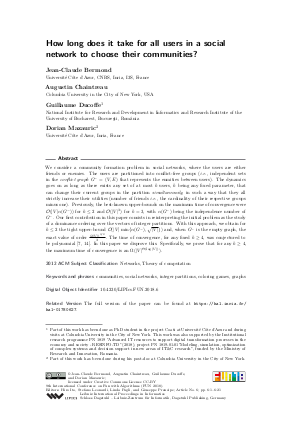How long does it take for all users in a social network to choose their communities?
Authors Jean-Claude Bermond, Augustin Chaintreau, Guillaume Ducoffe, Dorian Mazauric
-
Part of:
Volume:
9th International Conference on Fun with Algorithms (FUN 2018)
Part of: Series: Leibniz International Proceedings in Informatics (LIPIcs)
Part of: Conference: International Conference on Fun with Algorithms (FUN) - License:
 Creative Commons Attribution 3.0 Unported license
Creative Commons Attribution 3.0 Unported license
- Publication Date: 2018-06-04
File

PDF
LIPIcs.FUN.2018.6.pdf
- Filesize: 0.74 MB
- 21 pages
Document Identifiers
Related Versions
Subject Classification
ACM Subject Classification
- Networks
- Theory of computation
Keywords
- communities
- social networks
- integer partitions
- coloring games
- graphs
Metrics
- Access Statistics
-
Total Accesses (updated on a weekly basis)
0Document
0Metadata
Abstract
We consider a community formation problem in social networks, where the users are either friends or enemies. The users are partitioned into conflict-free groups (i.e., independent sets in the conflict graph G^- =(V,E) that represents the enmities between users). The dynamics goes on as long as there exists any set of at most k users, k being any fixed parameter, that can change their current groups in the partition simultaneously, in such a way that they all strictly increase their utilities (number of friends i.e., the cardinality of their respective groups minus one). Previously, the best-known upper-bounds on the maximum time of convergence were O(|V|alpha(G^-)) for k <= 2 and O(|V|^3) for k=3, with alpha(G^-) being the independence number of G^-. Our first contribution in this paper consists in reinterpreting the initial problem as the study of a dominance ordering over the vectors of integer partitions. With this approach, we obtain for k <= 2 the tight upper-bound O(|V| min {alpha(G^-), sqrt{|V|}}) and, when G^- is the empty graph, the exact value of order ((2|V|)^{3/2})/3. The time of convergence, for any fixed k >= 4, was conjectured to be polynomial [Escoffier et al., 2012][Kleinberg and Ligett, 2013]. In this paper we disprove this. Specifically, we prove that for any k >= 4, the maximum time of convergence is an Omega(|V|^{Theta(log{|V|})}).
Cite As Get BibTex
Jean-Claude Bermond, Augustin Chaintreau, Guillaume Ducoffe, and Dorian Mazauric. How long does it take for all users in a social network to choose their communities?. In 9th International Conference on Fun with Algorithms (FUN 2018). Leibniz International Proceedings in Informatics (LIPIcs), Volume 100, pp. 6:1-6:21, Schloss Dagstuhl – Leibniz-Zentrum für Informatik (2018)
https://doi.org/10.4230/LIPIcs.FUN.2018.6
BibTex
@InProceedings{bermond_et_al:LIPIcs.FUN.2018.6,
author = {Bermond, Jean-Claude and Chaintreau, Augustin and Ducoffe, Guillaume and Mazauric, Dorian},
title = {{How long does it take for all users in a social network to choose their communities?}},
booktitle = {9th International Conference on Fun with Algorithms (FUN 2018)},
pages = {6:1--6:21},
series = {Leibniz International Proceedings in Informatics (LIPIcs)},
ISBN = {978-3-95977-067-5},
ISSN = {1868-8969},
year = {2018},
volume = {100},
editor = {Ito, Hiro and Leonardi, Stefano and Pagli, Linda and Prencipe, Giuseppe},
publisher = {Schloss Dagstuhl -- Leibniz-Zentrum f{\"u}r Informatik},
address = {Dagstuhl, Germany},
URL = {https://drops.dagstuhl.de/entities/document/10.4230/LIPIcs.FUN.2018.6},
URN = {urn:nbn:de:0030-drops-87972},
doi = {10.4230/LIPIcs.FUN.2018.6},
annote = {Keywords: communities, social networks, integer partitions, coloring games, graphs}
}
Author Details
- National Institute for Research and Development in Informatics and Research Institute of the University of Bucharest, Bucureşti, România
Funding
- Ducoffe, Guillaume: Part of this work has been done as PhD student in the project Coati at Université Côte d'Azur and during visits at Columbia University in the City of New York. This work was also supported by the Institutional research programme PN 1819 Ädvanced IT resources to support digital transformation processes in the economy and society - RESINFO-TD" (2018), project PN 1819-01-01"Modeling, simulation, optimization of complex systems and decision support in new areas of IT&C research", funded by the Ministry of Research and Innovation, Romania.
- Mazauric, Dorian: Part of this work has been done during his post-doc at Columbia University in the City of New York.
References
-
C. Ballester. NP-completeness in hedonic games. Games and Economic Behavior, 49(1):1-30, 2004.

-
J. A. Bondy and U. S. R. Murty. Graph theory. Grad. Texts in Math., 2008.

-
T. Brylawski. The lattice of integer partitions. Discrete Mathematics, 6(3):201-219, 1973.

-
I. Chatzigiannakis, C. Koninis, P. N. Panagopoulou, and P. G. Spirakis. Distributed game-theoretic vertex coloring. In OPODIS'10, pages 103-118, 2010.

-
J. Chen, R. Niedermeier, and P. Skowron. Stable marriage with multi-modal preferences. In EC, 2018. to appear.

-
G. Ducoffe. Propriétés métriques des grands graphes. PhD thesis, Université Côte d'Azur, December 2016.

-
B. Escoffier, L. Gourvès, and J. Monnot. Strategic coloring of a graph. Internet Mathematics, 8(4):424-455, 2012.

-
M. Flammini, G. Monaco, and Q. Zhang. Strategyproof mechanisms for additively separable hedonic games and fractional hedonic games. In WAOA, pages 301-316, 2017.

-
C. Greene and D. J. Kleitman. Longest chains in the lattice of integer partitions ordered by majorization. European Journal of Combinatorics, 7(1):1-10, jan 1986.

-
J. Hajduková. Coalition formation games: A survey. International Game Theory Review, 8(04):613-641, 2006.

-
G. H. Hardy and E. M. Wright. An introduction to the theory of numbers. Oxford University Press, 1979.

-
M. Hoefer and W. Jiamjitrak. On proportional allocation in hedonic games. In SAGT, pages 307-319. Springer, 2017.

-
D. S. Johnson, C. H. Papadimitriou, and M. Yannakakis. How easy is local search? Journal of computer and system sciences, 37(1):79-100, 1988.

-
J. Kleinberg and K. Ligett. Information-sharing in social networks. Games and Economic Behavior, 82:702-716, 2013.

-
M. Mnich and I. Schlotter. Stable marriage with covering constraints-a complete computational trichotomy. In SAGT, pages 320-332. Springer, 2017.

-
K. Ohta, N. Barrot, A. Ismaili, Y. Sakurai, and M. Yokoo. Core stability in hedonic games among friends and enemies: impact of neutrals. In IJCAI, 2017.

-
I. Olkin and A. W. Marshall. Inequalities: theory of majorization and its applications, volume 143. Academic press, 2016.

-
P. N. Panagopoulou and P. G. Spirakis. A game theoretic approach for efficient graph coloring. In ISAAC'08, pages 183-195, 2008.

